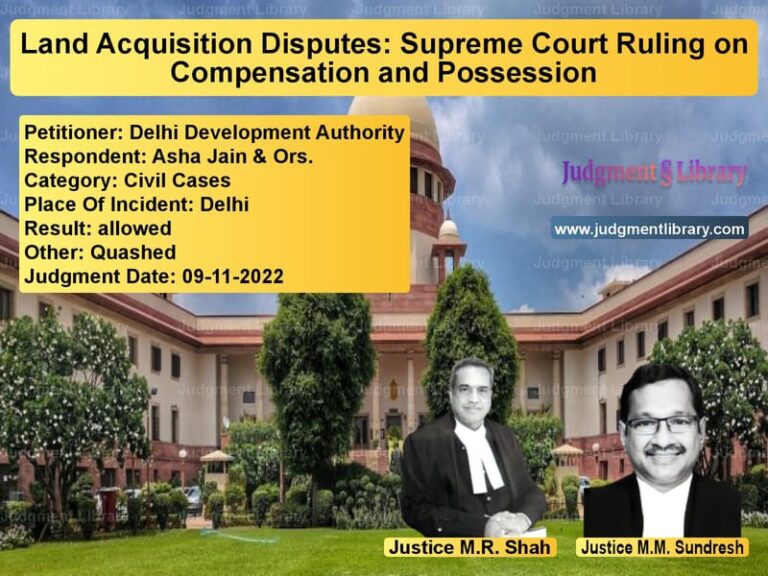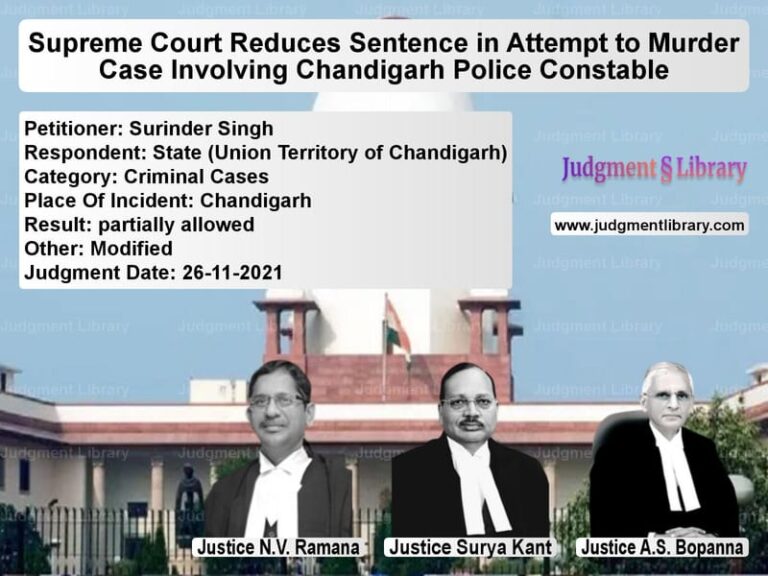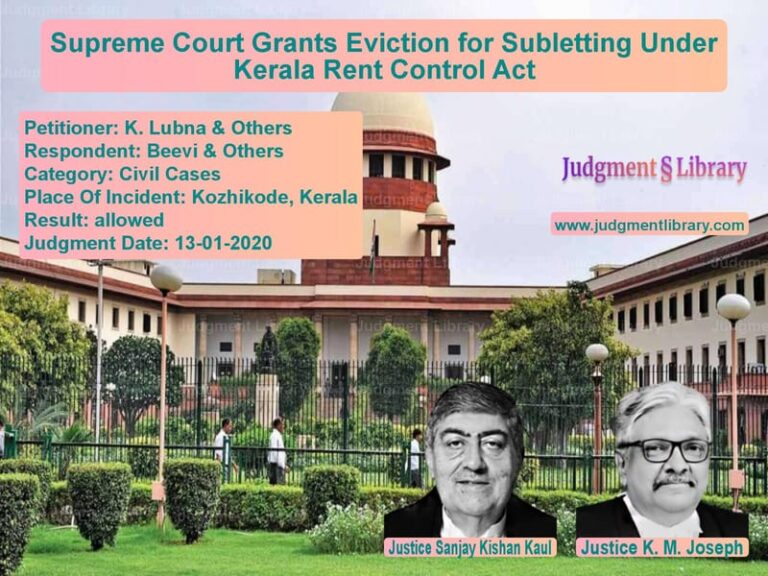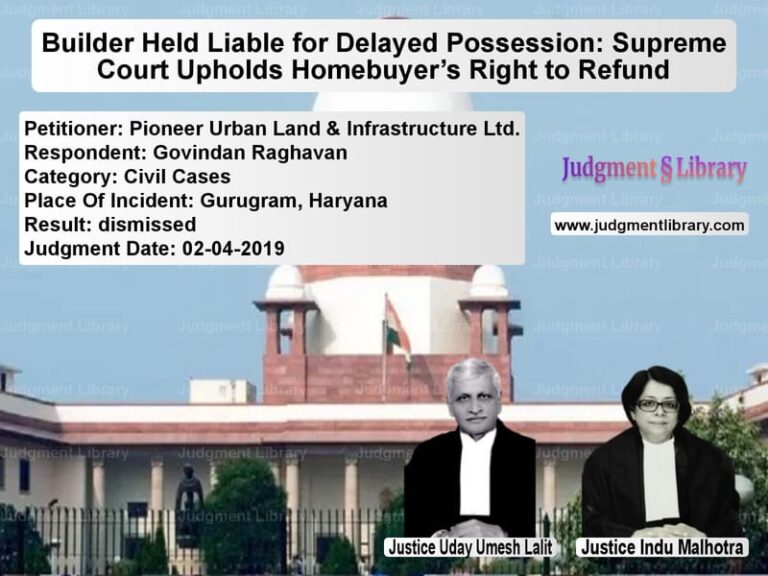Anticipatory Bail in Money Laundering Case: Supreme Court’s Decision on P. Chidambaram’s Plea
The Supreme Court of India recently delivered a significant judgment in the case of P. Chidambaram vs. Directorate of Enforcement, where the former Union Finance Minister sought anticipatory bail in a money laundering case related to the INX Media scandal. This case revolved around alleged irregularities in the clearance given by the Foreign Investment Promotion Board (FIPB) to INX Media for receiving foreign investment beyond the approved limit. The Supreme Court’s decision, which denied the plea for anticipatory bail, has major implications for financial fraud investigations and the application of the Prevention of Money Laundering Act (PMLA).
Background of the Case
The case against P. Chidambaram arose from allegations of corruption and money laundering linked to INX Media. In 2007, INX Media Pvt. Ltd. sought FIPB approval for foreign direct investment (FDI). The approved limit was Rs. 4.62 crores, but INX Media allegedly received Rs. 305 crores in violation of the approval conditions. Investigators alleged that this was done with the influence of Chidambaram’s son, Karti Chidambaram, in exchange for illicit financial benefits.
The Central Bureau of Investigation (CBI) registered an FIR in 2017 against INX Media, Karti Chidambaram, and others, leading to a separate case by the Enforcement Directorate (ED) under PMLA. The ED claimed that illicit payments were routed through shell companies and disguised as consultancy fees.
Legal Questions in the Case
- Whether anticipatory bail should be granted in an economic offense under PMLA.
- Whether the evidence against Chidambaram was sufficient to warrant custodial interrogation.
- Whether denying anticipatory bail violated Chidambaram’s fundamental rights under Article 21 of the Constitution.
- Whether financial crimes should be treated differently from other criminal offenses in bail considerations.
Arguments by P. Chidambaram (Petitioner)
Senior advocates Kapil Sibal and Abhishek Manu Singhvi represented Chidambaram and presented the following arguments:
- The approval for INX Media’s FDI was granted by a multi-member FIPB board, and Chidambaram merely signed the decision in the normal course of official business.
- No direct evidence linked Chidambaram to illegal gratification.
- His son, Karti Chidambaram, was neither a shareholder nor a director in Advantage Strategic Consulting Pvt. Ltd. (ASCPL), the firm accused of receiving illicit payments.
- The ED’s reliance on documents in a sealed cover violated the principle of fair trial.
- He had already cooperated with investigators on multiple occasions, and custodial interrogation was unnecessary.
- The alleged offenses took place in 2007-08, but PMLA was amended only in 2009 to cover such offenses, making retrospective application illegal under Article 20(1) of the Constitution.
Arguments by Directorate of Enforcement (Respondent)
Solicitor General Tushar Mehta, representing the ED, countered with the following points:
- PMLA is a stringent law enacted to curb money laundering, and economic offenses must be treated differently from conventional crimes.
- The ED had substantial evidence of illicit money transfers routed through overseas bank accounts.
- The agency needed custodial interrogation to track the money trail effectively.
- Granting anticipatory bail at this stage would obstruct the investigation.
- The Supreme Court had previously held that economic offenses require a stricter approach in bail matters.
- The argument regarding retrospective application of PMLA was incorrect since the alleged transactions continued even after 2009.
Supreme Court’s Observations and Ruling
After hearing detailed arguments, the Supreme Court delivered the following key observations:
- Anticipatory bail is an extraordinary remedy and should be granted only in exceptional circumstances.
- Money laundering poses a serious threat to the economy and must be dealt with stringently.
- Custodial interrogation is essential to uncover complex financial transactions and the real beneficiaries.
- Granting bail at this stage would impede the investigation.
- The sealed cover evidence could be reviewed by the court to satisfy its judicial conscience.
- There was sufficient material to justify custodial interrogation.
Accordingly, the Supreme Court dismissed the appeal and upheld the Delhi High Court’s decision rejecting Chidambaram’s anticipatory bail plea.
Implications of the Judgment
- For Economic Offenses: The ruling reinforces the principle that economic offenses warrant stricter bail conditions.
- For Investigations: It affirms the need for custodial interrogation in financial crimes involving complex money trails.
- For Judicial Precedent: The judgment sets a precedent for future cases involving PMLA and anticipatory bail.
Conclusion
The Supreme Court’s decision in this case underscores the seriousness of money laundering offenses and the necessity for thorough investigations. By denying anticipatory bail, the Court reinforced the principle that financial crimes require a stringent approach, balancing individual liberty with the need to curb economic offenses. The ruling serves as a guiding principle for future cases involving high-profile economic offenses.
Petitioner Name: P. Chidambaram.Respondent Name: Directorate of Enforcement.Judgment By: Justice R. Banumathi, Justice A.S. Bopanna.Place Of Incident: New Delhi.Judgment Date: 05-09-2019.
Don’t miss out on the full details! Download the complete judgment in PDF format below and gain valuable insights instantly!
Download Judgment: P. Chidambaram vs Directorate of Enfor Supreme Court of India Judgment Dated 05-09-2019.pdf
Direct Downlaod Judgment: Direct downlaod this Judgment
See all petitions in Money Laundering Cases
See all petitions in Bail and Anticipatory Bail
See all petitions in Fraud and Forgery
See all petitions in Judgment by R. Banumathi
See all petitions in Judgment by A. S. Bopanna
See all petitions in dismissed
See all petitions in supreme court of India judgments September 2019
See all petitions in 2019 judgments
See all posts in Criminal Cases Category
See all allowed petitions in Criminal Cases Category
See all Dismissed petitions in Criminal Cases Category
See all partially allowed petitions in Criminal Cases Category







